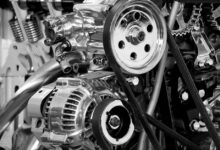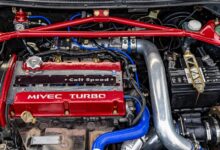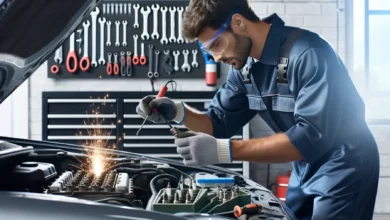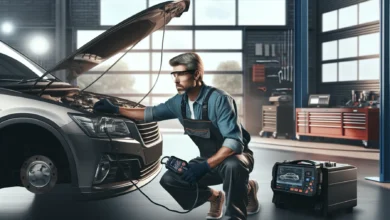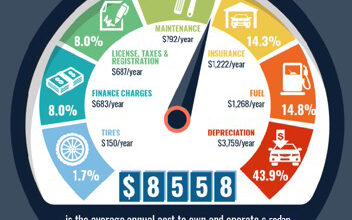Engine Repair Cost Guide: Average Prices, Factors, and Money-Saving Tips for Car Owners
Sponsored Ads
When my car’s engine started making strange noises, I knew I was in for a stressful ride, not just to the mechanic but through a maze of repair bills and decisions. Engine trouble can hit hard and fast, leaving me wondering how much the fix will cost me. It’s one of those car problems that feels overwhelming because the costs can swing wildly depending on what’s wrong.
I’ve learned that understanding what affects engine repair costs can help me prepare for the unexpected. Whether it’s a minor fix or a significant overhaul, knowing what to expect can save time, money, and a lot of headaches. Let’s break down what goes into engine repair pricing so I can make more intelligent choices the next time my engine acts up.
Understanding Engine Repair Cost
Evaluating engine repair cost starts with identifying the severity of the engine issue. Minor repairs, such as spark plug replacements or hose fixes, typically average between $100 and $400 at reputable service centers like Firestone or Midas. Moderate maintenance, such as timing belt or water pump replacements, usually falls within a $500 to $1,500 range when all labor rates and OEM parts are included. Major repairs, such as complete engine rebuilds or replacements, often exceed $2,500 and can reach $7,000 for high-performance vehicles, according to estimates from RepairPal and AAA.
Assessing the accuracy of repair costs depends on the specific make, model, and year of the car. Luxury brands, such as BMW or Lexus, for example, consistently require higher part prices and labor rates compared to domestic vehicles like Ford or Chevrolet. Factoring in shop location and expertise influences the quote—urban regions and certified mechanics typically charge more.
Comparing estimates ensures a better understanding of fair pricing. Gathering at least three itemized quotes from ASE-certified shops gives a benchmark for costs. Verifying that the quotes include diagnostic fees, parts sourcing, recommended replacements, and warranty coverage highlights differences.
Analyzing the long-term impact provides further clarity. Extensive repairs on older cars may cost more than the car’s value if resale prices are under $2,000, making engine swap or replacement less practical. Checking the vehicle’s Blue Book value helps support the decision on whether to proceed with an expensive repair.
Budgeting for future repairs benefits from using average cost expectations and tracking recurring engine issues. Documenting previous repairs and service intervals helps predict upcoming expenses, thereby limiting surprises when new problems arise.
Factors That Affect Engine Repair Cost

The cost of engine repair depends on several key variables. I use specific criteria when determining how much I expect to pay for repairs.
Type and Extent of Damage
The type and extent of damage directly impact the cost of engine repair. Minor issues, such as worn spark plugs, leaking gaskets, or the need for oil filter replacement, typically involve low fees and quick solutions. Major failures, such as cracked engine blocks, damaged pistons, or seized crankshafts, require advanced labor and expensive components, often raising the total expense by 10 times or more compared to minor repairs. I assess the damage severity by conducting a thorough inspection and reviewing the technician’s report to identify clear cost drivers.
Vehicle Make and Model
Vehicle make and model often dictate the parts price, labor requirements, and necessary expertise for engine repairs. For example, luxury brands such as BMW, Mercedes-Benz, and Audi utilize premium parts and highly specialized service, which substantially raises overall costs. Mainstream brands like Toyota or Ford typically use more commonly available parts, which allows them to benefit from lower labor costs. I research average repair costs for my specific vehicle model on reputable automotive resources to anticipate price ranges.
Labor Costs
Labor costs account for a substantial portion of engine repair bills. Hourly rates at certified mechanics or dealerships often range from $70 to $200, depending on the region and level of specialization. Complex jobs, such as engine overhauls or timing chain replacements, require more labor hours. I review shop labor rates ahead of time and include projected hours to estimate the labor portion of the total repair bill.
Parts Availability and Quality
Parts availability and quality influence both the timeline and the total cost of engine repairs. Rare or discontinued parts, such as components for vintage vehicles or high-performance engines, cause price spikes and longer wait times. Factory-original (OEM) parts typically cost more than aftermarket or refurbished alternatives; however, they often offer higher reliability. I weigh the benefits of OEM parts versus aftermarket options based on my budget and performance needs.
Location of the Repair Shop
The location of the repair shop often affects the cost of engine work. Urban areas and coastal states typically feature higher shop rates and overhead expenses than rural or inland locations. For example, repairs in Los Angeles or New York City often exceed costs in smaller Midwest towns for the same service. I compare estimates from shops within my area to find competitive pricing without sacrificing service quality.
Common Engine Repairs and Their Costs
Engine repair expenses depend on the complexity of the issue and the vehicle’s specifications. I analyze some of the most frequent repairs and their average costs, using recent industry sources and data from repair shops.
Head Gasket Replacement
Head gasket replacement involves significant labor, as technicians must disassemble several engine components—the average cost ranges from $1,100 to $2,000. Higher-end vehicles, such as those from BMW or Mercedes-Benz, can cost $ 2,500 or more due to the use of more expensive parts and additional labor requirements.
Timing Belt or Chain Replacement
Timing belt or chain replacement prevents engine failure if performed at the manufacturer’s recommended intervals. Most timing belt replacements cost $500 to $1,500. Chain replacements often exceed $2,000 for modern engines, especially when guides, tensioners, or water pumps need to be replaced simultaneously.
Cylinder Head Repairs
Cylinder head repairs encompass machining services, valve replacements, and resurfacing. Typical expenses range from $800 to $1,600. Engine overheating or cracked heads can escalate replacement costs to above $2,000 for specific models with complex multi-valve heads.
Complete Engine Overhaul or Replacement
Engine overhaul or replacement represents the most extensive service. Rebuilding an engine costs between $2,500 and $4,000. Full replacements for new or remanufactured engines span $3,500 to $7,000+. Luxury and high-performance vehicles, such as those from Audi or Lexus, may exceed these figures due to increased engineering complexity.
Minor vs. Major Repairs
Minor repairs, such as spark plug or ignition coil replacement, typically incur costs of $100 to $500 in parts and labor, provided no significant engine disassembly is involved. Major repairs, such as piston or crankshaft work, regularly exceed $1,500 and may require additional component replacements, which further compound total costs.
| Repair Type | Cost Range | Example Vehicles |
|---|---|---|
| Head Gasket Replacement | $1,100–$2,500+ | Honda Accord, BMW 328i |
| Timing Belt Replacement | $500–$1,500 | Toyota Camry, Subaru Outback |
| Timing Chain Replacement | $2,000+ | Ford F-150, Chevy Malibu |
| Cylinder Head Repairs | $800–$2,000+ | Hyundai Elantra, Audi A4 |
| Engine Overhaul/Rebuild | $2,500–$4,000 | Nissan Altima, Ford Explorer |
| Engine Replacement | $3,500–$7,000+ | Lexus RX350, Dodge Ram 1500 |
| Minor Engine Repairs | $100–$500 | Honda Civic, Kia Soul |
How to Estimate Your Engine Repair Cost
Accurately calculating my potential repair expenses starts with a methodical approach. I focus on three main steps that create a reliable estimate for any engine issue.
Getting a Professional Diagnosis
Securing a professional diagnosis pinpoints the underlying engine problem. I scheduled an inspection with a certified technician at a reputable shop. Diagnostic testing identifies issues such as worn timing belts, head gasket failures, or fuel system malfunctions. Accurate assessments limit the risk of unexpected costs and ensure the estimates include all necessary parts and labor. Detailed diagnostic reports list the required repairs and distinguish between urgent and preventative work.
Requesting Multiple Quotes
Comparing multiple repair quotes exposes price variations between shops. I request written estimates from at least three ASE-certified mechanics in my area and confirm each includes diagnostics, parts, labor, and warranty coverage. For example, head gasket replacement quotes may range from $1,100 to over $ 2,500 due to varying shop rates and part sources. Collecting detailed breakdowns highlights outliers and uncovers included services or hidden fees. If shops omit warranty terms or diagnostic costs, I clarify before making a decision.
Online Repair Cost Calculators
Utilizing online repair cost calculators provides a national and local cost reference. I enter my car’s year, make, and model with the specific repair required. Trusted platforms such as RepairPal and Kelley Blue Book offer repair range data based on verified service center inputs. These tools take into account the complexity of engine repair, vehicle type, and regional labor rates. Comparing calculator results with local quotes validates estimates and strengthens my negotiating position.
Ways to Save on Engine Repair Cost
I use several cost-saving strategies to address my engine repair needs efficiently. Each approach reduces expenses and extends the engine’s lifespan.
Using Aftermarket vs. OEM Parts
I compare aftermarket and OEM parts before any repair. Aftermarket parts — such as air filters by Fram and Denso ignition coils — typically cost 20% to 40% less than OEM parts and often meet the same quality standards set by the manufacturer. OEM parts from brands like Honda or Toyota offer factory-level compatibility but tend to be more expensive and have limited availability, especially for older models. I confirm warranty terms and quality certifications with the part supplier when selecting non-OEM options to maintain repair reliability and avoid unexpected failures.
Performing Simple Repairs Yourself
I perform simple repairs myself to reduce engine repair costs for minor engine issues. Routine tasks — like replacing spark plugs (Bosch or NGK), swapping air filters, or changing engine oil — save $80 to $200 per job compared to shop rates. I watch manufacturer-approved tutorial videos and use the vehicle’s service manual for accurate guidance. I limit DIY work to basic repairs if I don’t own the necessary tools or have automotive experience.
Regular Maintenance to Prevent Costly Repairs
I schedule regular maintenance for my engine to avoid major breakdowns and high repair expenses. Replacing timing belts, inspecting belts and hoses, and flushing cooling systems at manufacturer-recommended intervals reduces the likelihood of catastrophic failures. I track maintenance milestones using my vehicle’s service history and set reminders for oil changes, coolant flushes, and tune-ups. This preventive care extends engine life and reduces the likelihood of unexpected issues and costly repairs.
Warning Signs of Engine Problems
Detecting engine problems early helps limit repair costs and prevent extensive damage. I check these indicators when evaluating engine health.
Unusual Noises
Knocking, ticking, and tapping sounds from the engine indicate problems with moving parts, such as worn bearings or lifters. Hissing noises suggest vacuum leaks or coolant system issues, for example, broken hoses or radiator leaks. Grinding during startup signals starter or flywheel damage. I always compare these sounds to the manufacturer’s usual operation standards when narrowing potential causes.
Warning Lights
The illuminated check engine light signals that the car’s computer has detected a malfunction in the engine control system. Flashing warning lights, especially during operation, highlight critical problems like misfires or emissions system failures. The oil pressure and temperature warning lights prompt me to check the fluid levels and the integrity of the engine cooling system immediately. Ignoring these indicators increases the risk of severe engine failure.
Engine Performance Issues
Experiencing rough idling, hesitation, or power loss indicates problems with fuel delivery, ignition timing, or sensor failures. Stalling, difficulty starting, and surging performance point to clogged fuel filters, failing spark plugs, or malfunctioning electronic controls. Noticing reduced fuel economy alongside performance drops highlights inefficiencies that raise operational costs and signal underlying engine deterioration.
Troubleshooting Common Engine Repair Cost Issues
Engine repair costs often generate stress when surprises or gaps in coverage emerge. I approach these common issues by focusing on practical, actionable steps.
Handling Unexpected Expenses
Managing unexpected engine repair bills benefits from building a dedicated emergency fund for automotive repairs. I allocate a percentage of my monthly budget—typically 5%—to a high-yield savings account labeled for urgent car expenses. Negotiating payment plans directly with repair shops sometimes results in interest-free or extended arrangements, especially at local businesses or large chains like Firestone. Exploring financing options from providers such as Synchrony Car Care can quickly provide funds if my savings fall short. Checking with insurance agents about ride-share reimbursement or rental car coverage helps limit disruption if my car remains in the shop longer than expected.
Dealing with Insufficient Warranties
I consult my warranty documents to confirm the limits and exclusions of my powertrain or extended coverage. When my repair falls outside covered components or mileage caps, seeking goodwill repairs from the manufacturer may be successful if I maintain a consistent service record at authorized dealerships. Considering third-party warranty extensions, such as Carchex or Endurance, can sometimes reduce my long-term financial risk, especially when I own my car beyond the factory coverage. Evaluating aftermarket warranties with reputable Better Business Bureau ratings helps avoid scams or claim denials. I always verify claim procedures before agreeing to supplemental plans.
What to Do if the Repair Exceeds Your Car’s Value
When my repair estimate exceeds the vehicle’s current market value, I obtain an official appraisal using resources like the Kelley Blue Book and compare it with trade-in quotes from dealers such as CarMax. Selling the vehicle “as-is” to private buyers on platforms like Facebook Marketplace or Craigslist may recoup more value than a trade-in if the car remains drivable. Donating a vehicle to a non-profit organization for a tax deduction can provide a better net result than paying for a significant repair. If none of these options prove financially reasonable, recycling through a licensed auto salvage yard, which often pays cash for engine-damaged cars, eliminates ongoing costs and generates immediate value.
Alternative Options to Engine Repair
Multiple alternatives exist when major engine repairs surpass the car’s value or practicality. I compare options based on cost, reliability, and long-term value to identify the best fit for my situation.
Rebuilt or Remanufactured Engines
Choosing a rebuilt or remanufactured engine often cuts costs compared to performing a complete in-shop engine repair. Rebuilt engines utilize existing components that are cleaned and replaced as needed; for example, mechanics typically reuse blocks while replacing pistons or bearings. Remanufactured engines undergo complete disassembly, precision machining, and installation of factory-new components. Generally, rebuilt engines cost $2,500–$4,000, while remanufactured engines range from $3,000–$6,000, including labor, and add value through extended warranties (commonly a 1–3 year warranty from reputable suppliers, such as Jasper Engines). I select this route if the car’s body and transmission remain structurally sound.
Engine Swaps
Opting for an engine swap involves replacing the original engine with a used or compatible one, rather than rebuilding it. Salvage yards and used parts dealers (such as LKQ or Pick-n-Pull) often provide engines between $1,200 and $3,500, sometimes bundled with short-term warranties. Swapping engines sometimes expands options by allowing the choice of more reliable models or upgraded outputs for compatible vehicles. Labor for swaps typically ranges from $1,500 to $2,500 due to the required wiring and ECM configuration. I consider a swap if I find a low-mileage, proven replacement engine for my model.
Selling or Trading in the Vehicle
Selling or trading in the vehicle often recovers some of the costs, especially if the repair bill approaches the car’s resale value. Private sales for non-running vehicles typically net $500–$2,000, depending on the age and condition. Dealerships offer trade-ins that minimize hassle; for example, trading a non-running sedan for a $1,000–$3,000 credit toward another vehicle, even if the value is below that of a fully running car. Salvage yards sometimes pay by weight, averaging $300 to $600 for complete vehicles. Listing the car as “mechanic’s special” appeals to buyers seeking project cars or parts. I use this approach if I prefer upgrading rather than making significant repairs.
Conclusion
Facing engine repair costs can feel overwhelming, but having the correct information makes a big difference. I’ve learned that a proactive approach—researching estimates, staying alert to warning signs, and budgeting for repairs—can help minimize surprises.
When repair bills exceed the value of your car, it’s worth exploring alternatives, such as rebuilt engines or even selling the vehicle. By staying informed and weighing your options, you’ll be better prepared to handle whatever engine challenges come your way.
Frequently Asked Questions
What factors influence engine repair costs?
Engine repair costs depend on the severity of the issue, your car’s make and model, labor rates, parts availability, and your location. Luxury or imported vehicles, as well as major engine issues, typically cost more to repair.
How much do minor and major engine repairs usually cost?
Minor engine repairs, such as spark plug replacements, typically cost between $100 and $400. Moderate maintenance, such as timing belt replacements, ranges from $500 to $1,500. Major repairs, including complete engine rebuilds, can exceed $2,500 and reach $7,000 for certain vehicles.
Are luxury car engine repairs more expensive?
Yes. Luxury brands typically incur higher repair costs due to the expense of parts, specialized labor, and limited aftermarket options.
How can I get a fair price on engine repairs?
Get written estimates from at least three ASE-certified repair shops. Compare quotes to ensure all necessary diagnostics, parts, labor, and warranty terms are included.
Are aftermarket parts a good way to save on engine repairs?
Aftermarket parts can be 20%–40% less expensive than original equipment manufacturer (OEM) parts and often meet similar quality standards. However, fit and durability can vary by brand.
Should I consider major repairs on older vehicles?
Major repairs on older cars may not be worth the investment if the repair cost exceeds the vehicle’s current market value. Consider both the resale value and long-term reliability before making a decision.
What are the warning signs that my engine needs repairs?
Early warning signs include engine knocking, grinding, or hissing noises, dashboard warning lights, rough idling, unusual exhaust smoke, or loss of power.
How can I save money on engine repairs?
Perform simple DIY maintenance, use quality aftermarket parts, stay on top of regular service, and track your car’s maintenance history to catch problems early and avoid larger bills.
What should I do if the repair costs exceed my car’s value?
If the repair cost exceeds your car’s market value, consider options such as selling the car “as-is,” recycling it, or swapping it for a rebuilt or used engine.
Are there payment or warranty options for expensive engine repairs?
Many shops offer payment plans for extensive repairs. Please review your warranty coverage and consider purchasing third-party warranties to help cover future repair expenses.
How do I estimate engine repair costs before visiting a shop?
Use online repair cost calculators for reference, get a professional diagnosis, and request detailed written quotes from multiple repair shops. This helps validate estimates and avoid overpaying.



